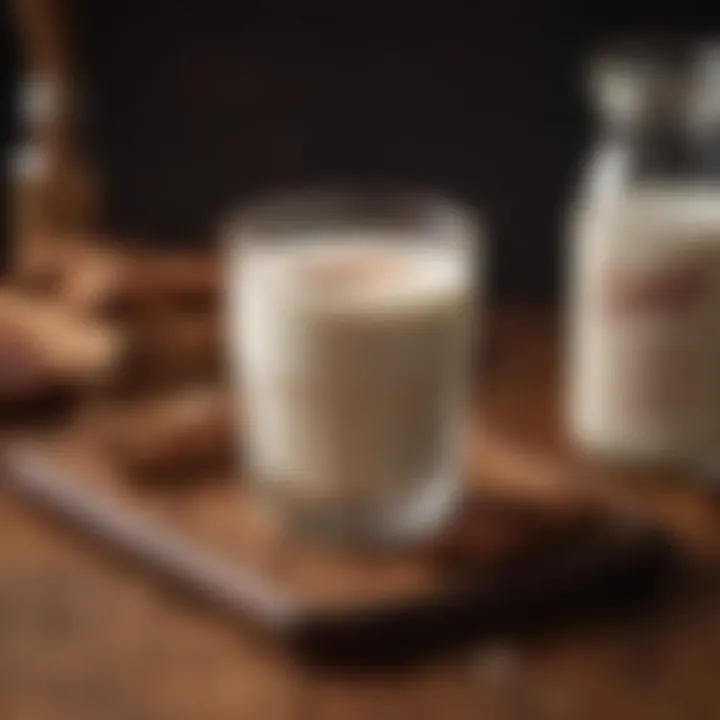Exploring Nighttime Drinks for Better Sleep Quality


Intro
In today’s fast-paced world, quality sleep can often feel elusive. Many people struggle with insomnia or restlessness, and these issues can take a toll on overall well-being. One effective way to promote relaxation before bed is through nighttime drinks. This article will explore drinks that are known for their calming properties. It covers ingredients that help induce sleep, recipes, and ways to incorporate these beverages into your evening routine for better rest.
Ingredients Breakdown
Nighttime drinks are often composed of ingredients that help soothe the mind and body. Below we will investigate primary and optional components that can contribute to better sleep.
Primary Ingredients
Certain elements have been researched for their sedative effects. Here are some essential ingredients:
- Chamomile: This herb is renowned for its calming properties. It can help reduce anxiety and promote sleep.
- Lavender: Known for its fragrant scent, lavender oil also offers relaxing qualities when consumed.
- Milk: A classic choice for bedtime, warm milk contains tryptophan, an amino acid that elevates serotonin and melatonin levels.
- Honey: Besides being a natural sweetener, honey can help release melatonin in the brain.
Optional Ingredients
Adding optional ingredients can enhance flavor and benefit. Consider:
- Cocoa powder: Rich in antioxidants and magnesium, it can help the nervous system.
- Nuts: Almonds, walnuts, or a splash of nut milk provide additional magnesium, essential for good sleep.
- Herbal flavors: Such as peppermint or lemon balm offer an extra dimension of taste and can promote relaxation.
Essential Kitchen Tools
Some basic tools can make the preparation easier:
- Teapot: For brewing loose-leaf tea.
- Blender: Helpful for smoothies or to mix drinks well.
- Measuring spoons: Ensures accuracy while preparing ingredients.
Step-by-Step Preparation
Preparing these drinks can be straightforward and enjoyable.
Prepping the Ingredients
First, gather all the necessary ingredients. Measure out your chamomile, milk, or any other additions according to your chosen recipe. Make sure everything is within reach.
Cooking Techniques and Methods
Each drink may have specific methods. Here’s a brief overview:
- Brew chamomile or lavender tea by steeping in boiling water.
- Heat milk gradually for optimal texture.
- You can also blend a smoothie with nuts and cocoa.
Assembly and Presentation Tips
Host a visual array by:
- Using transparent glasses for warm drinks to showcase rich colors.
- Garnishing with sprigs of fresh herbs or dusting a pinch of cocoa on top.
Dietary Considerations
Paying attention to dietary needs ensures everyone can partake.
Gluten-Free Options
Many herbal options don’t contain gluten. Stick with ingredients that are inherently gluten-free, like chamomile or milk.
Vegetarian and Vegan Substitutes
For vegans, almond milk, oat milk, or coconut milk functions well instead of dairy milk. Empahsis should be placed on plant-based sweeteners too.
Nutrition Facts & Nutritional Considerations
When assessing the nutrition:
- Aim for low-sugar versions of drinks.
- Focus on serving sizes - larger quantities can lead to disrupted sleep.
Variations and Customizations
Those interested in unique twists can experiment beyond the norm.
Flavor Enhancements
Take advantage of seasonal spices. Cinnamon, nutmeg, or cardamom can awaken flavors in your choice of beverage.
Alternative Cooking Methods


Besides preparing drinks hot, consider:
- Making iced versions for a refreshing take.
- Assembling mixers & focus on tea-infused cocktails, suitable for non-alcoholic enjoyment.
Pairing Suggestions (Sides, Drinks, etc.
)
If serving these drinks alongside snacks, consider light options.
- Fresh fruit can balance heavier drinks.
- Include air-fried snacks like popcorn or roasted chickpeas, both of which are habit-forming?
Common Answers to Common Questionss and Troubleshooting
Providing useful answers and tips can enhance the reader's experience.
Frequently Asked Questions
- How long before bed should I consume these drinks? Aim for 30 to 60 minutes to let your body digest.
- Can these drinks be stored? Most should be consumed fresh but can be refrigerated for a day at most.
Common Mistakes to Avoid
When preparing:
- Be cautious with added sugars that can lead to energy fluctuations.
- Don’t rush the brewing process. It affect flavor quality.
Solutions to Potential Problems
If you find a drink falls flat, often adjusting proportions can make a significant cnange. Adding more of the primary ingredients or a dash ofheld spices can enhance the experience.
Prelims to Nighttime Drinks for Sleep
Understanding the role of nighttime drinks in the pursuit of better sleep is crucial for anyone seeking to improve their rest. Sleep is not merely a passive activity; it is a mental and physical state vital for our overall health. These drinks can often serve not just as a ritual before bed but as an aid in improving sleep quality and promoting relaxation. This section will explore the relationship between sleep and nighttime beverages, ensuring an informed approach to incorporating them into daily routines.
The Importance of Sleep
Sleep plays a critical role in physical and mental health. It is during sleep that our body performs essential processes including regeneration, immune function, and memory consolidation. Poor sleep can lead to decreased cognitive abilities, a weakened immune system, and an increased risk of various chronic conditions. Therefore, making sleep a priority is indispensable. Nighttime drinks that promote relaxation may support a smoother transition into sleep. Common ingredients often found in these beverages can influence sleep by calming the mind and setting a holistic state conducive to rest.
How Drinks Can Influence Sleep Quality
The selection of nighttime beverages can potentially impact sleep quality significantly. Certain compounds found in plants and food items have physiological effects on the body. For example, the presence of a compound called flavonoids in some herbal teas can variably enhance relaxation. Meanwhile, warm dairy and non-dairy drinks can yield sedative effects through their effects on serotonin levels. It is not simply the act of drinking that aids sleep but rather the combined effects of the specific ingredients, enhancing relaxation and preparing the body for a restful night.
"The right drink at the right time may provide the calming effect that paves the way for restful sleep."
Understanding how different nighttime drinks interact with our body's internal processes empowers health-conscious individuals to choose their evening libations wisely. With growing interest in the relationship between diet and sleep, it becomes vital to explore options that are beneficial for nightly rituals.
Common Ingredients in Sleep-Inducing Drinks
Including the right ingredients in sleep-inducing drinks is crucial for enhancing their effectiveness. These ingredients have properties that can promote relaxation and improve sleep quality. Understanding what combines well and what supports better sleep will aid in making informed choices.
Herbs and Botanicals
Chamomile
Chamomile has a reputation as a gentle sedative. The active compounds in chamomile, such as apigenin, are believed to bind to specific receptors in the brain, resulting in a calming effect. This characteristic makes chamomile tea a popular choice for those seeking tranquility at night. Furthermore, it is easy to prepare, making it accessible for many. However, some individuals may face allergies or have adverse reactions. Thus, caution is advised.
Valerian Root
Valerian Root is another beneficial herb known for its sleep-inducing properties. Valerian reportedly increases levels of gamma-aminobutyric acid (GABA), a compound that relaxes nerves in the brain. Its unique feature lies in its pronounced effect, often leading to shortened sleep onset time. However, it carries an earthy taste that may not be palatable for everyone. Users may also experience mild side effects like drowsiness the following day.
Lemon Balm
Lemon Balm is noted for its pleasant lemon scent and calming effects. Traditionally, it is used to reduce anxiety and promote sleep. Its effectiveness is attributed to compounds that not only soothe but also decrease stress. Aside from its benefits, it is commonly regarded as safe with minimal side effects. However, excessive consumption may lead to headaches in some sensitive individuals.
Dairy and Non-Dairy Options
Warm Milk
Warm milk has long been associated with sleep. The warmth creates a soothing effect, while milk contains tryptophan, an amino acid linked to melatonin production. This combination of physical warmth and chemical support makes it comforting. Nevertheless, some people are lactose intolerant and cannot tolerate dairy well, making this option less suitable for them.
Coconut Milk
Coconut milk offers an alternative rich in healthy fats and magnesium, which can help relax muscles. The creamy texture is often preferred in smoothies as well as warming drinks. While it is popular with many, coconut milk has a distinct flavor that some may dislike. It might also be higher in calories than other options.
Almond Milk


Almond milk, being dairy-free, caters to a wider audience. It offers a smooth texture and a nodes of nutty flavor. It is low in calories, making it a sound option for those minding their weight. However, it lacks the same level of tryptophan found in cow's milk, potentially making it a lesser choice mainly focused on sleep-inducing qualities.
Teas and Infusions
Passionflower Tea
Passionflower tea is highly regarded for its sleep benefits. This tea contains flavonoids that may increase GABA levels, promoting better sleep. The soothing aroma and pleasant taste make it attractive for nightly routines. However, too much passionflower can lead to drowsiness when waking up, affecting daytime productivity.
Rooibos Tea
Rooibos tea is caffeine-free and rich in antioxidants. Known for its smooth and sweet flavor, it is an excellent base for a calming drink. This tea supports overall health and is free from common allergens. Still, some may find the flavor less appealing compared to other teas, which could limit its uptake during sleep preparation.
Peppermint Tea
Peppermint tea serves as a refreshing and soothing option that helps alleviate digestive discomfort. This might facilitate a restful sleep. Furthermore, it has a pleasant and widely enjoyed taste. However, it may not work for everyone due to its cooling effect. Some might find that it wakes them up instead of soothing them.
Fruit and Vegetable Juices
Cherry Juice
Cherry juice, particularly tart varieties, is known for its melatonin content. This quality makes it an effective beverage for sleep support. It offers a natural sweetness that many prefer without the need for additional sweeteners. However, it can be higher in sugar compared to order juices, making monitoring required for those sensitive to sugar intake.
Banana Smoothie
A banana smoothie combines tryptophan, potassium, and magnesium for muscle relaxation. The creaminess gives it a comforting quality, making it inviting. Yet, depending on the recipe, excess sugar from other ingredients may overshadow its sleep-inducing benefits. Moderation and balance in preparation are essential to maximize its potential.
Beet Juice
Beet juice may seem unconventional but bears important benefits. It improves circulation, which can enhance sleep quality indirectly. Plus, the vibrant color and unique flavor present distinctive appeal. People with digestive issues could face concerns, however; it's worth considering vector or preparations that financially manage those traits.
Including appropriate ingredients in nighttime drinks contributes significantly to achieving better sleep. Individual effects may vary; thus, considering preferences and tolerances is advisable when integrating these into your nightly rituals.
How to Prepare Nighttime Drinks
How to prepare nighttime drinks is an essential topic within this guide. Understanding the preparation provides knowledge about enhancing relaxation and promoting better sleep. When individuals pay attention to how they make these drinks, it adds to their effectiveness. The right methods can keep flavors in balance and ensure health benefits are maximized.
Step-by-Step Guide to Making Herbal Infusions
Herbal infusions are a traditional method of extracting properties from various herbs. They can foster relaxation and a sense of calm. This preparation is simple yet effective. Begin by boiling water. Quality water is important, as impurities may affect taste and benefits. Measure approximately one tablespoon of dried herbs per cup of water. Once the water is boiling, pour it over the herbs and cover the vessel. Steep the mixture for 5 to 15 minutes, according to personal preference. Covering it is vital as it prevents aromatic oils from escaping. After steeping is complete, strain the infusion into a cup. Adding natural sweeteners or a slice of lemon can improve taste without negating the benefits.
Creating Dairy and Nut Milk Blends
Using dairy or nut milk blends serves as a delicious base for nighttime drinks. Start with high-quality milk, whether it’s cow's milk, almond milk, or coconut milk. For a warm beverage, gently heat the milk but avoid boiling. Your goal should be a comfortable drinking temperature. While heating, consider adding ingredients like turmeric or cinnamon for flavor and enhanced properties. If using a blender, combine two tablespoons of your choice of softened nuts or seeds with one cup of water. Blend until smooth and strain to achieve a creamy blend. This approach offers flexibility. Substituting choices can keep the routine fresh, addressing dietary preferences beyond simple sleep aids.
Blending Fruit-Based Sleep Drinks
Fruit-based drinks can satisfy not only hunger but also work well for sleep. Start with fruits known for their calming properties, like bananas or cherries. For a banana smoothie, slice one banana and combine it with one cup of warm milk. Blend until smooth; consider adding- honey if desired. If you choose cherries, opt for pure cherry juice, or blend fresh cherries with warm water. The drink should be smooth without much pulp. It’s also important to regulate sugar content, as high sweetness can disrupt sleep. Balancing fruit flavors keeps the drink enjoyable
Making nighttime drinks can turn into a delightful ritual promoting better sleep hygiene.
Functional Benefits of Nighttime Drinks
Nighttime drinks serve more than just to quench thirst; they can provide functional benefits that aid in achieving better sleep quality. It is essential to understand these benefits as they can shape your evening routine and sleep habits toward a more restful experience.
Promoting Relaxation
Relaxation is crucial for anyone wishing to improve their sleep quality. Nighttime drinks can play an instrumental role in this process. Many individuals find that certain beverages help them chill after a long day. For example, drinks containing chamomile tea have long been recognized for their calming properties. Chamomile dynamically interacts with neurotransmitter receptors, which can lead to a reduced state of anxiety.
Other options, such as warm milk, often contain tryptophan—a precursor to serotonin and melatonin—hormones that facilitate sleep. Consuming a drink that has a relaxed vibe can send your brain cues to unwind. Ultimately, enjoying such beverages during the hour prior to bedtime encourages a state of serenity, making the transition to sleep smoother.
Aiding Digestion Before Sleep
Another important aspect of nighttime drinks is their aid in digestion. Digestive comfort is integral to achieving restorative sleep, and certain drinks can aid this process. For instance, peppermint tea is known to relax the muscles of the gastrointestinal tract, making it easier for food to move through the system. This kind of comfort becomes vital if one tends to experience indigestion or discomfort in the evening.
Additionally, drinks such as beet juice may benefit digestion as they promote the body’s nitric oxide production, which assists in blood vessel dilation. This can support improved blood flow and nutrient delivery, crucial for everyone, particularly those who consume heavier dinners.
Integrating these drinks into your evening regime can optimize digestion, thus setting the stage to cultivate a deep sleep.
Supporting Hormonal Balance
The hormonal balance within the body directly impacts sleep quality. Nighttime drinks can possibly contribute significantly to stabilize hormonal levels. For example, drinks rich in magnesium and calcium, such as almond milk, can promote hormonal health. Magnesium acts to calm the nervous system, while calcium plays a role in producing sleep-inducing melatonin.
Furthermore, herbal infusions like valerian root have properties that can moderate response to stress, effectively managing cortisol levels during predisposed late-night bars of activity.


Essentially, drinks tailored toward supporting hormonal balance not only foster improved sleep but also enhance overall well-being as part of a holistic approach to health.
In summary, choosing the right nighttime drinks can support relaxation, aid in digestion, and maintain hormonal balance, weaving into an effective, sleep-enhancing strategic routine.
Incorporating distinct nighttime drinks thoughtfully may culminate in enriched sleeping patterns, thus encouraging you to wake feeling rejuvenated each morning.
Potential Risks and Considerations
When exploring nighttime drinks for sleep, one must consider potential risks and key considerations. While many ingredients promote relaxation and sleep enhancement, they may also introduce various complications. Recognizing these factors is essential before integrating any new beverage into your nightly ritual. Paying attention to possible risks helps you enjoy these drinks safely while reaping their calming benefits.
Be Mindful of Caffeine Content
Caffeine is a well-known stimulant that can disrupt sleep patterns. It is crucial to mind the caffeine content of any evening drink. Certain herbal teas or flavored beverages may contain hidden sources of caffeine that could impede your ability to unwind effectively. This stimulant can linger in your system for several hours, creating a hurdle to falling asleep.
Recommendations:
- Check labels: Always read the ingredients list on packaged drinks, as some herbal blends may have included caffeinated components.
- Opt for caffeine-free options: If you crave a comforting tea, stick to those specifically labeled caffeine-free.
;; Caffeine does not always show obvious qualities. Maintaining awareness will prevent unexpected disturbances to your sleep cycle.
Allergic Reactions to Ingredients
Picking unfamiliar ingredients in nighttime drinks calls for mindfulness regarding possible allergens. Certain herbs, nuts, or fruits could elicit harmful reactions in sensitive individuals. Understanding specific allergies is vital in avoiding discomfort or adverse health effects. Even if something is natural, it does not mean it is safe for everyone.
Here are some preventive steps to take:
- Research ingredients: Familiarize yourself with known allergens.
- Perform a patch test: If trying a new ingredient, start small to assess your body's response before using it freely.
This graduatelly helps reduce unnecessary risks that could occur.
Sensitivity to Sugars and Sweeteners
Many consider sugars and sweeteners when crafting nighttime drinks. Whether natural or artificial, these substances can variably affect the body. Some people experience digestive upset from fructose or high-fiber ingredients commonly included in smoothies or fruit juices. Others might find sweeteners can create cravings or mood fluctuations, rationalizing avoidance.
Strategies for managing sweet ingredients:
- Limit added sugars: Opt for naturally sweet fruits in smaller amounts.
- Choose wisely: Research potential sweetening alternatives with milder effects.
Proactive decisions during ingredient selection can improve the overall drinking experience and promote restful sleep.
Incorporating Nighttime Drinks into Your Routine
Incorporating nighttime drinks into your routine can greatly affect your ability to unwind and prepare for restful sleep. The process of selecting the right drink and establishing a consistent routine can signal your body that it’s time to relax. The choice of ingredients often impacts each individual's overall wellbeing, making it crucial to find what works best for you.
It is beneficial to consider timing when you choose to consume these drinks. Generally, an optimal window to benefit from these beverages is within one to two hours before bedtime. The soothing properties of ingredients such as chamomile or valerian root will have the best effect within this timeframe, allowing your body to absorb their calming qualities gradually.
Timing: When to Drink
Understanding when to consume nighttime drinks is key. Consuming these drinks too late might interfere with your sleep. Caffeine often, yet inadvertently, sneaks into many individuals' routines, so being mindful of when you integrate your night drink is essential. Moreover, be aware of personal variations; some may need more time to experience the effects while others may benefit from a shorter pre-sleep duration. The idea is to tailor your drinking time to fit your personal schedule, ensuring you can unwind and relax effectively.
Creating a Relaxing Environment
Enhancing the experience of drinking your nighttime beverage requires creating the right atmosphere. Your surroundings should reflect peace and tranquility. Dim the lights, perhaps add a scented candle with lavender or a calming air diffuser. Soft music can further elevate this feeling of stillness, making it optimal for delving into relaxation. Nestling into a comfortable setting transforms your drink into part of a holistic wind-down process.
Combining with Other Relaxation Practices
To obtain maximum benefits from your nighttime drinks, consider pairing them with other relaxation habits. Practices such as meditation, reading, or light stretches can significantly contribute to inducing sleepiness. Formulating a night ritual blends those moments of calm before sleep naturally. When you start merging relaxation practices into drinking your chosen beverage, it can create a seamless transition from your busy day to peaceful slumber.
It’s important to remember that everyone is unique. Finding what relaxing practice works for you is sometimes a matter of trial and error.
As you develop your routine, remain aware of your body's feedback and modify your approach according to what feels best. Overall, wellbeing takes precedence, and a profoundly designed routine can place you on a firm path toward restful nights.
Epilogue and Final Thoughts
In summary, this article has undertaken a thorough exploration of nighttime drinks and their potential to enhance sleep quality. Understanding the elements at play—be it the calming effects of specific herbs, the nutritional benefits of various milk alternatives, or the soothing nature of certain teas—serves as a valuable journey. Each ingredient can offer unique benefits and aids in fostering better relaxation before sleep.
Shaping a drink into a wholesome nighttime ritual contributes significantly to mental calmness and better sleep. The delicate balance between ingredients, preparation methods, and timing can transform these beverages into facilitators of peace. Incorporating these drinks into nightly routines can cultivate habits that align with sleep promotion and mindfulness.
Moreover, it is crucial to recognize potential risks associated with the addition of these drinks into one's routine. Knowledge about the caffeine, allergens, and sugar present in different options empowers individuals to make informed choices. Especially in modern lifestyles where sleep often evades many, lightening the load with calming drinks presents a compelling argument for beneficial evening practices.
Discovering the right blend of ingredients may not only simplify your path to sleep but enchant the routine that precedes rest.
Summary of Key Takeaways
- Nighttime drinks, when chosen wisely, can significantly promote relaxation and improve sleep quality.
- Key ingredient categories include herbs, dairy alternatives, teas, and fruit juices, each boasting unique properties beneficial for sleep.
- Preparation methods can vary, and understanding these methods allows for a personal touch to enhance flavor and consolidate health benefits.
- While effectiveness varies by individual, awareness of personal sensitivities and preferences plays an integral role in settling into a satisfying bedtime routine.
Encouragement to Explore New Recipes
Exploring and experimenting with new drink recipes is encouraged. Each individual has distinct tastes and needs. Familiarity with varied options may unlock enhanced relaxation techniques. Here are ideas to get started:
- Try blending calming chamomile tea with oat milk or nutmeg for warmth and richness.
- Vary the balance of ingredients such as adding honey or maple syrup in moderation to enhance sweetness yet retain health-boosting components.
- Utilize seasonal fruits like autumn – think pumpkin smoothies or summer berries in soothing milk-based blends. Every attempt brings insights into the symbiotic relationship between taste, comfort, and relaxation. A broad variety brings you closer to creating your ideal nighttime beverage, contributing to a peaceful mindset as part of winding down for sleep.







